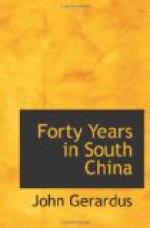“One boat’s company were taken ashore, stripped naked, wounded, and robbed of everything. They finally made their way overland to Amoy. The other three boats, after the crew and passengers had been stripped and robbed, were let go to sea. They providentially fell in with a steamer which took them to Foochow. Such atrocities were once common here.
“We do not believe that any large proportion of the foreign residents in China wish war. We do wish, however, the rights secured to us by treaty. These, with a proper policy, can be secured without war. We wish most heartily to avoid war. Besides all its other evils it would be a sad thing for our work and our churches. We still hope that God in His providence will ward it off. He will do it in answer to our prayers if so it be best for His cause. This is our only hope, and it is sufficient.”
The threatening war cloud did blow over, and a restraint, at least temporary, was laid upon the officials and the people in their treatment of foreigners.
XI. THE LAST TWO DECADES.
Dr. Talmage was a man of strong convictions, at the same time possessed of a spirit of genuine catholicity. The brethren connected with the London and English Presbyterian Missions recognized him as a true friend. In his later years he became the Nestor of the three Missions, the venerated patriarch, the trusted counselor.
It will not be inappropriate to give two letters expressive of his good-will toward his fellow laborers. The one was written on the occasion of Rev. John Stronach’s return to England:
FORTY CONTINUOUS YEARS IN HEATHENISM.
“March 16, 1876. Today we said farewell to the veteran missionary, Rev. John Stronach.
“He has been laboring many years at this place in connection with the London Missionary Society. This morning he left us for his native land by a new route.
“Each of the three Missions has one or more boats employed exclusively in carrying missionaries and native preachers on their trips to and from the various outstations accessible by water. These boats are called by the native Christians ‘hok-im-chun,’ which means ‘Gospel boat.’ Mr. Stronach embarked on one of these ‘Gospel boats.’ He expected to land at one of the Mission stations on the mainland northeast from Amoy, and then travel overland on foot or by sedan-chair to Foochow. He will spend the remaining nights of this week and the Sabbath at various stations under the care of the Missions at Amoy, and say some parting words to the native Christians.
“He expects early next week to meet one of the Methodist missionaries of Foochow, and in company with him to pass on to that city, spending the nights at stations under the care of the Foochow Missions. We may now travel overland from Amoy to Foochow (a distance of one hundred and fifty miles) and spend every night, sometimes take our noonday meals, at a Christian chapel. Does this look as if missions were a failure in this region? At Foochow Mr. Stronach will take steamer for Shanghai, thence to Yokohama and San Francisco.




